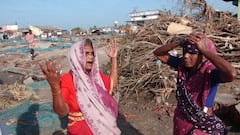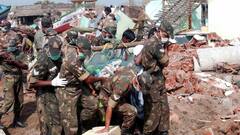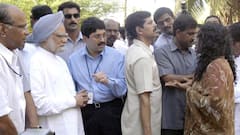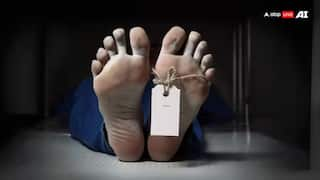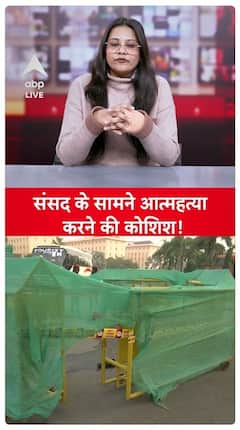Explorer
Advertisement
Low-intensity earthquake hits Jammu and Kashmir, tremors felt in Srinagar
A low-intensity earthquake hit the state of Jammu and Kashmir late Sunday afternoon. Mild tremors were felt in Srinagar for around three seconds, prompting people to rush out of their homes in some areas.

Earthquake in Jammu and Kashmir: An earthquake measuring 3.2 on the Richter scale hit Jammu and Kashmir on Sunday.
(PTI)
SRINAGAR: A low-intensity earthquake hit the state of Jammu and Kashmir late Sunday afternoon. Mild tremors were felt in Srinagar for around three seconds, prompting people to rush out of their homes in some areas. People panicked because of the tremors but no casualty or damage was reported. The 3.3 magnitude earthquake was felt around 6:06 pm.
More details awaited.
What to Do During an Earthquake
Stay as safe as possible during an earthquake. Be aware that some earthquakes are actually foreshocks and a larger earthquake might occur. Minimize your movements to a few steps that reach a nearby safe place and stay indoors until the shaking has stopped and you are sure exiting is safe.
If indoors
- DROP to the ground; take COVER by getting under a sturdy table or other piece of furniture; and HOLD ON until the shaking stops. If there is no a table or desk near you, cover your face and head with your arms and crouch in an inside corner of the building.
- Protect yourself by staying under the lintel of an inner door, in the corner of a room, under a table or even under a bed.
- Stay away from glass, windows, outside doors and walls, and anything that could fall, (such as lighting fixtures or furniture).
- Stay in bed if you are there when the earthquake strikes. Hold on and protect your head with a pillow, unless you are under a heavy light fixture that could fall. In that case, move to the nearest safe place.
- Use a doorway for shelter only if it is in close proximity to you and if you know it is a strongly supported, load bearing doorway.
- Stay inside until the shaking stops and it is safe to go outside. Research has shown that most injuries occur when people inside buildings attempt to move to a different location inside the building or try to leave.
- Be aware that the electricity may go out or the sprinkler systems or fire alarms may turn on.
If outdoors
- Do not move from where you are. However, move away from buildings, trees, streetlights, and utility wires.
- If you are in open space, stay there until the shaking stops. The greatest danger exists directly outside buildings; at exits; and alongside exterior walls. Most earthquake-related casualties result from collapsing walls, flying glass, and falling objects.
If in a moving vehicle
- Stop as quickly as safety permits and stay in the vehicle. Avoid stopping near or under buildings, trees, overpasses, and utility wires.
- Proceed cautiously once the earthquake has stopped. Avoid roads, bridges, or ramps that might have been damaged by the earthquake.
If trapped under debris
What to Do Before an Earthquake
- Do not light a match
- Do not move about or kick up dust.
- Cover your mouth with a handkerchief or clothing.
- Tap on a pipe or wall so rescuers can locate you. Use a whistle if one is available. Shout only as a last resort. Shouting can cause you to inhale dangerous amounts of dust.
- Repair deep plaster cracks in ceilings and foundations. Get expert advice if there are signs of structural defects.
- Anchor overhead lighting fixtures to the ceiling.
- Follow BIS codes relevant to your area for building standards
- Fasten shelves securely to walls.
- Place large or heavy objects on lower shelves.
- Store breakable items such as bottled foods, glass, and china in low, closed cabinets with latches.
- Hang heavy items such as pictures and mirrors away from beds, settees, and anywhere that people sit.
- Brace overhead light and fan fixtures.
- Repair defective electrical wiring and leaky gas connections. These are potential fire risks.
- Secure water heaters, LPG cylinders etc., by strapping them to the walls or bolting to the floor.
- Store weed killers, pesticides, and flammable products securely in closed cabinets with latches and on bottom shelves.
- Identify safe places indoors and outdoors.
- Under strong dining table, bed
- Against an inside wall
- Away from where glass could shatter around windows, mirrors, pictures, or where heavy bookcases or other heavy furniture could fall over
- In the open, away from buildings, trees, telephone and electrical lines, flyovers and bridges
- Know emergency telephone numbers (such as those of doctors, hospitals, the police, etc)
- Educate yourself and family members
Follow Breaking News on ABP Live for more latest stories and trending topics. Watch breaking news and top headlines online on ABP News LIVE TV
View More
Advertisement
Trending News
Advertisement
Advertisement
Top Headlines
India
India
Election 2024
Cities
Advertisement
















